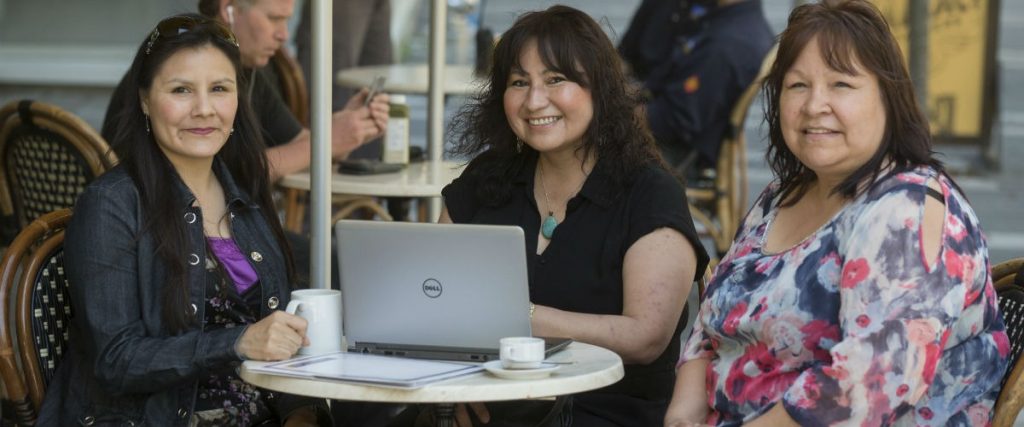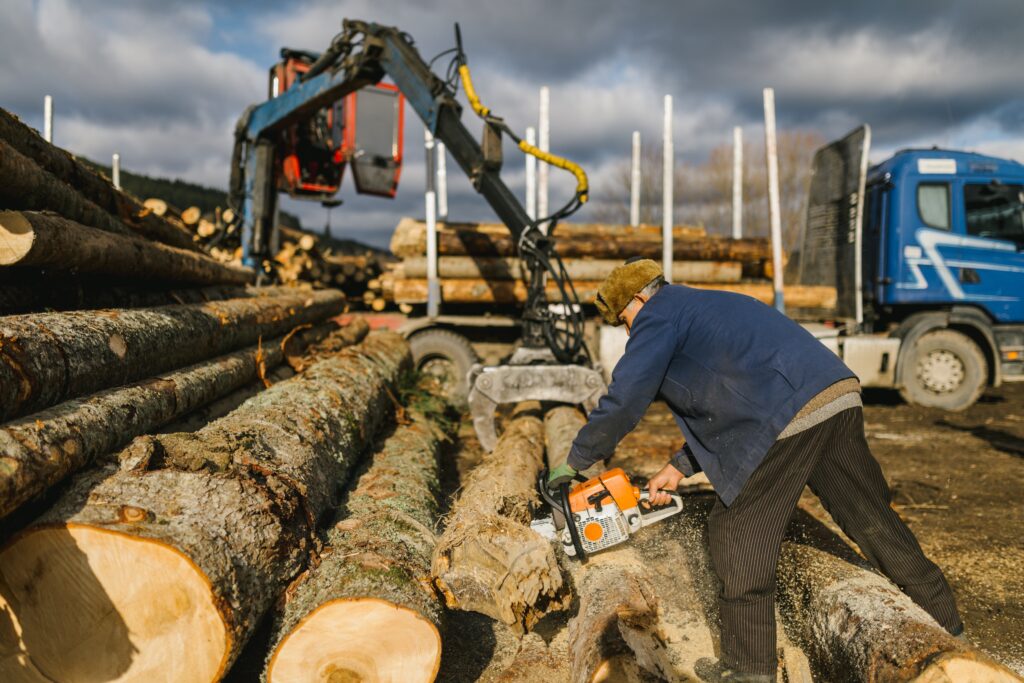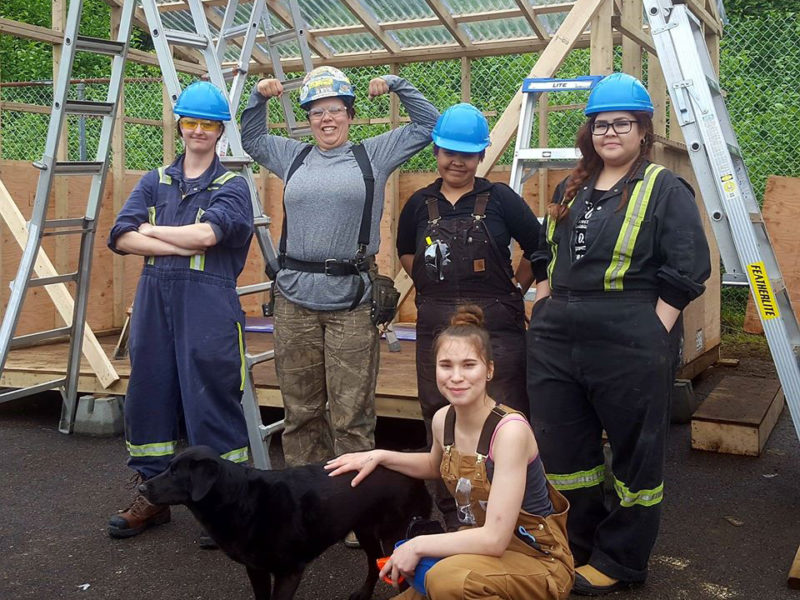 Executive Summary
Executive Summary
The community members of the Cowichan Nation Alliance—which include Halalt First Nation, Cowichan Tribes, Penelakut Tribe and Stz’uminus First Nation in British Columbia—are striving to become self-sufficient communities through employment and self-reliance.
Employment opportunities for Indigenous Peoples in Canada have historically lagged behind those for non-Indigenous people. Persistent barriers, such as a lack of job opportunities, insufficient work experience, inadequate training, and racism, compound this issue. Yet, there is unmet industry demand for skilled labour, which the growing Indigenous population could address.
The Indigenous Employment Hub, led by the Coast Salish Development Corporation and co-delivered by Stz’uminus Education Society, addressed these disparities with a community-centred employment initiative. The project aimed to offer training for Indigenous workers through assessments, training plans, job placements and work transition support. The project built multiple partnerships with the community, local employers, training providers and government officials.
The Indigenous Employment Hub did 150 skills assessments, trained 100 community members—with 50 achieving certification—and secured 80 job placements. A few challenges emerged: addressing clients’ needs over time, developing a network (this takes time) and maintaining client engagement post-training.
The project underscored the importance of community-centred approaches and outreach within the context of a strong network of employers. Insights from the Indigenous Employment Hub project show that culturally specific, community-driven employment programs with tailored, collaborative interventions hold potential to bridge employment gaps between Indigenous and non-Indigenous people in Canada.
Key Insights
The Indigenous Employment Hub trained 100 community members, 50 of whom achieved certification, and secured 80 job placements.
A flexible, long-term approach to training and employment helped address client needs and establish a strong, sustainable network with employers and community members.
Face-to-face interactions with clients helped to uncover hidden needs, such as work clothes, and build strong relationships.
 The Issue
The Issue
The communities of the Cowichan Nation Alliance—which comprises Halalt First Nation, Cowichan Tribes, Penelakut Tribe and Stz’uminus First Nation in British Columbia—are striving to become independent and self-sufficient. Employment and self-reliance are key to reaching this vision.However, employment rates have remained consistently lower forIndigenous Peoples when compared to the general Canadian population. Some of the challenges and employment barriers that Indigenous people face include inadequate training for available jobs, insufficient work experience, racism, gender stereotyping and limited job research skills.
At the same time, the labour market needs skilled trade workers, and the Indigenous population is the fastest-growing segment in Canada. Tapping into this workforce could address labour market needs. Taking a community-based approach to address the needs and employment barriers faced by Indigenous communities while aligning with industry’s unmet demand for skilled labour offers a new approach to skills training for this community. This approach could be more effective in harnessing the potential of the Cowichan Nation Alliance communities than current employment programs, fostering career development as well as self-reliance.

 What We Investigated
What We Investigated
The Indigenous Employment Hub initiative was designed to promote short- and long-term employment among community members of the Cowichan Nation Alliance. The project was led by the Coast Salish Development Corporation in partnership with the Stz’uminus Education Society.
The Indigenous Employment Hub project tested whether a community-centred approach to training, employment and partnerships would result in better employment outcomes than existing employment program models. It also examined how addressing client-identified needs and barriers could lead to better results and ultimately contribute to self-reliance among Cowichan Nation Alliance community members. The project also aimed to create a model that could be applied in other Indigenous communities.
The project’s multiple stakeholders included local employers, training providers and government officials at municipal, provincial, federal and First Nation levels. The target demographic was adult members of the Cowichan Nation Alliance.
One key feature of the project was to provide training on-reserve, close to community and businesses. Employment support took a holistic approach that offered a mix of life skills and technical/job skills training. In addition, the learning approach was based on First Nations culture. An emphasis on face-to-face engagement was considered essential to provide tailored support. The project planners also prioritized active relationship-building with partners, with the goal of creating a sustainable training and support network.
The research questions guiding this project were as follows:
- Will a community-centred approach to training, employment and partnerships result in better outcomes than existing employment program models?
- Will addressing client-identified needs and barriers lead to better employment outcomes?
- What types of partnerships are required to build and sustain a training and support network that supports better employment outcomes?
Stz’uminus Education Society was chosen to deliver the outreach and training component because of its experience in education and its community connections. Coast Salish Development Corporation had connections with business and provincial partners.
The project was implemented in phases, starting with the setup of the Indigenous Employment Hub. The physical training space included classrooms, offices and equipment. Partnership building was also initiated early in the project’s life cycle. The team actively took part in community engagement, through events, job fairs and ceremonies, to connect and understand their target audience and identify existing opportunities.
Those who participated in the program received skill assessments, training plans and customized training, as well as job placement and on-the-job and job-transitions support. After training, ongoing support, such as on-the-job coaching and post-job support, was offered through a career navigator.
 What We’re Learning
What We’re Learning
The Indigenous Employment Hub project provided 150 skill assessments. Following the development of customized training plans, 100 community members received training, 50 of whom received certification. The project team established 80 job placements with industry partners and the province of BC.
The establishment of the Indigenous Employment Hub physical space, equipped with classrooms, offices, computers and other equipment, provided a conducive meeting space and learning environment.
The investment of time and effort into building relationships and understanding the unique community dynamic was worthwhile. Face-to-face interactions with community members helped the team understand community needs, build personal connections, uncover hidden needs and establish a foundation of trust.
Indeed, it was felt that in future, even more emphasis should be placed on building relationships and a reputation in the community to meet clients’ needs. The team faced unexpected challenges in connecting with clients who wanted employment support. It took time to build relationships and trust with prospective clients and find effective ways to offer support.
The value of tailored approaches was more important than expected, as the level of need among clients was greater and more varied than anticipated. While a few clients required a quick infusion of training or equipment to gain employment, others needed a longer time frame to develop skills and complete formal training. Clients’ readiness for employment varied greatly, as each individual brought different strengths and had different and complex challenges to address, such as physical and emotional wellness, academic or work readiness, and different training needs.
Two other barriers emerged for some clients: the need for basic work gear and lack of transportation. Clients’ willingness to engage increased once the Indigenous Employment Hub team began supplying work clothes, work boots and other basic items.
There were also challenges in maintaining engagement with clients post-training. The Career Navigator role did support clients in transitioning into employment, but the growing client base made it challenging to follow up consistently.
Overall, the time frame needed to realize the intended result of this project (short- and long-term employment) was longer than expected. Developing a strong network, helping clients gain consistent employment and building a reputation in the community were all critical, but took months to build. On a positive note, the business connections and network of clients, training and service providers, employers and policymakers was a success and lasted beyond the project duration.
Most clients who engaged with the Indigenous Employment Hub would require a series of steps, over time, to move from under- or unemployment to consistent employment, depending on their circumstances. Consistent support and connections would be necessary to maintain forward momentum.
In refining future interventions, the project team recognized the need for a multi-stage approach to employment support, starting with community outreach and relationship-building, followed by tailored training and ongoing follow-up.
 Why It Matters
Why It Matters
The insights from the Indigenous Employment Hub project have implications for employment and training policy and practice for Indigenous communities across the country.
One of the main lessons was the value of culturally specific, community-driven employment programs. By taking the time to build relationships with the community and centre Indigenous views in program design, the project achieved more sustainable outcomes.
Policymakers and funders should note the benefits of multi-year, flexible funding models that adapt to changing needs and circumstances. It took time to establish strong partnerships among Indigenous communities, educational institutions and local employers, yet these relationships were key to the project’s success. They ensured that training programs were relevant and aligned with both market needs and community members’ needs. Flexible timing allowed the team to customize support. Some clients experienced setbacks in their employment journeys before taking steps to move forward, so multi-year support is sometimes beneficial.

State of Skills:
Supporting Indigenous and Northern Entrepreneurship and SMEs
Indigenous and Northern entrepreneurship and businesses play a crucial role in bolstering local economies by supporting economic diversification, job creation and community development.
Transportation barriers, which impacted access to training, work and health services, highlight a broader need for policies to address transportation inequities in rural and remote areas. Integrating transportation solutions into employment and training programs could improve accessibility and participation rates.
The project’s incremental learning approach, which addressed each individual’s pace and learning style, provides a model for educational and training programs in other contexts. This approach could be of benefit in other settings where traditional models have not met learners’ needs.
 What’s Next
What’s Next
The Indigenous Employment Hub continues to connect Indigenous workers with employment and offer customized training to meet industry demand.
Have questions about our work? Do you need access to a report in English or French? Please contact communications@fsc-ccf.ca.
More from FSC
Strength in structure
North Coast Skills Hub
Early Childhood Education Lab
How to Cite This Report
McLaren, K. (2024). Project Insights Report: Indigenous Employment Hub, Coast Salish Development Corporation. Toronto: Future Skills Centre. https://fsc-ccf.ca/projects/indigenous-employment-hub/
Indigenous Employment Hub is funded by the Government of Canada’s Future Skills Program. The opinions and interpretations in this publication are those of the author and do not necessarily reflect those of the Government of Canada.




